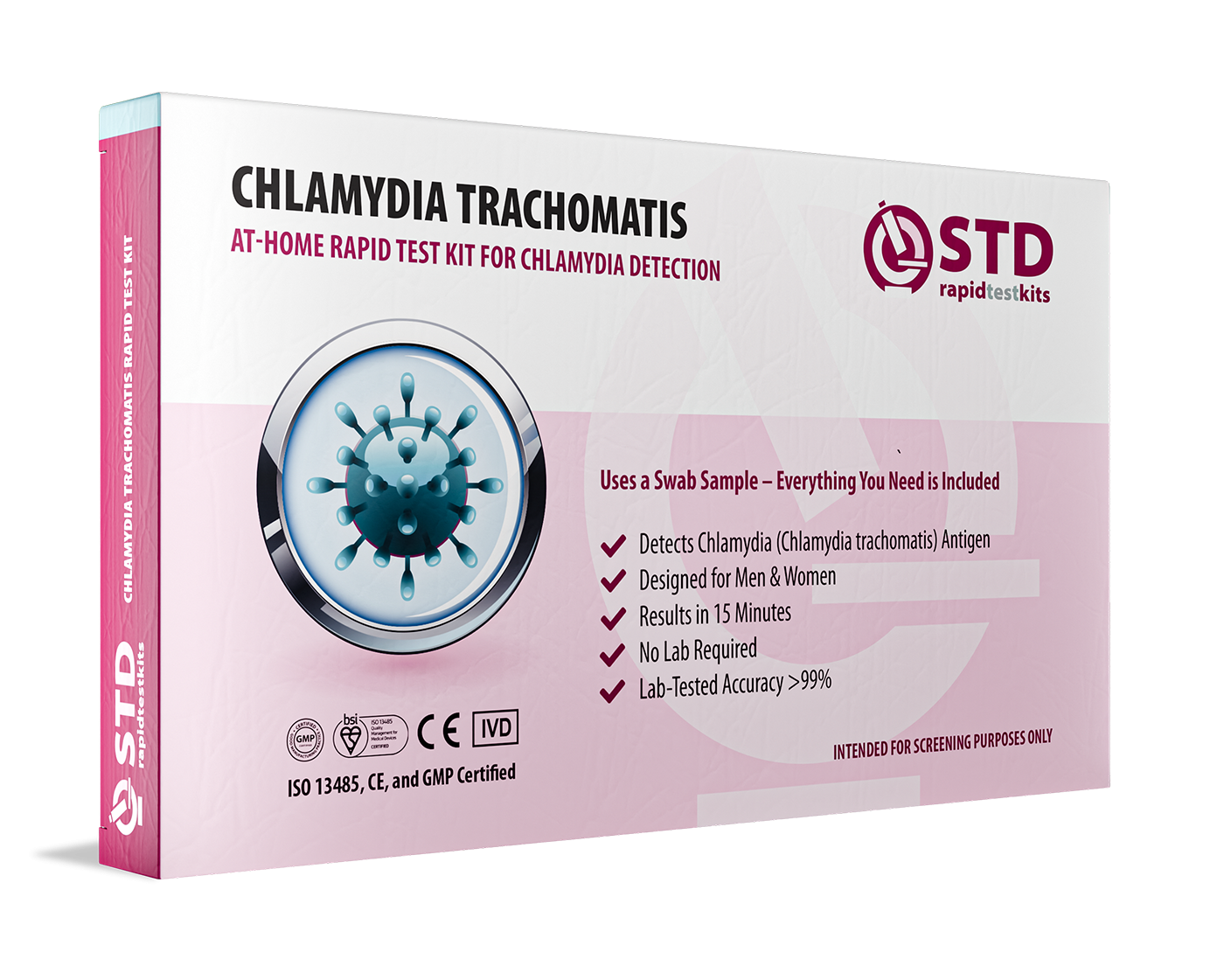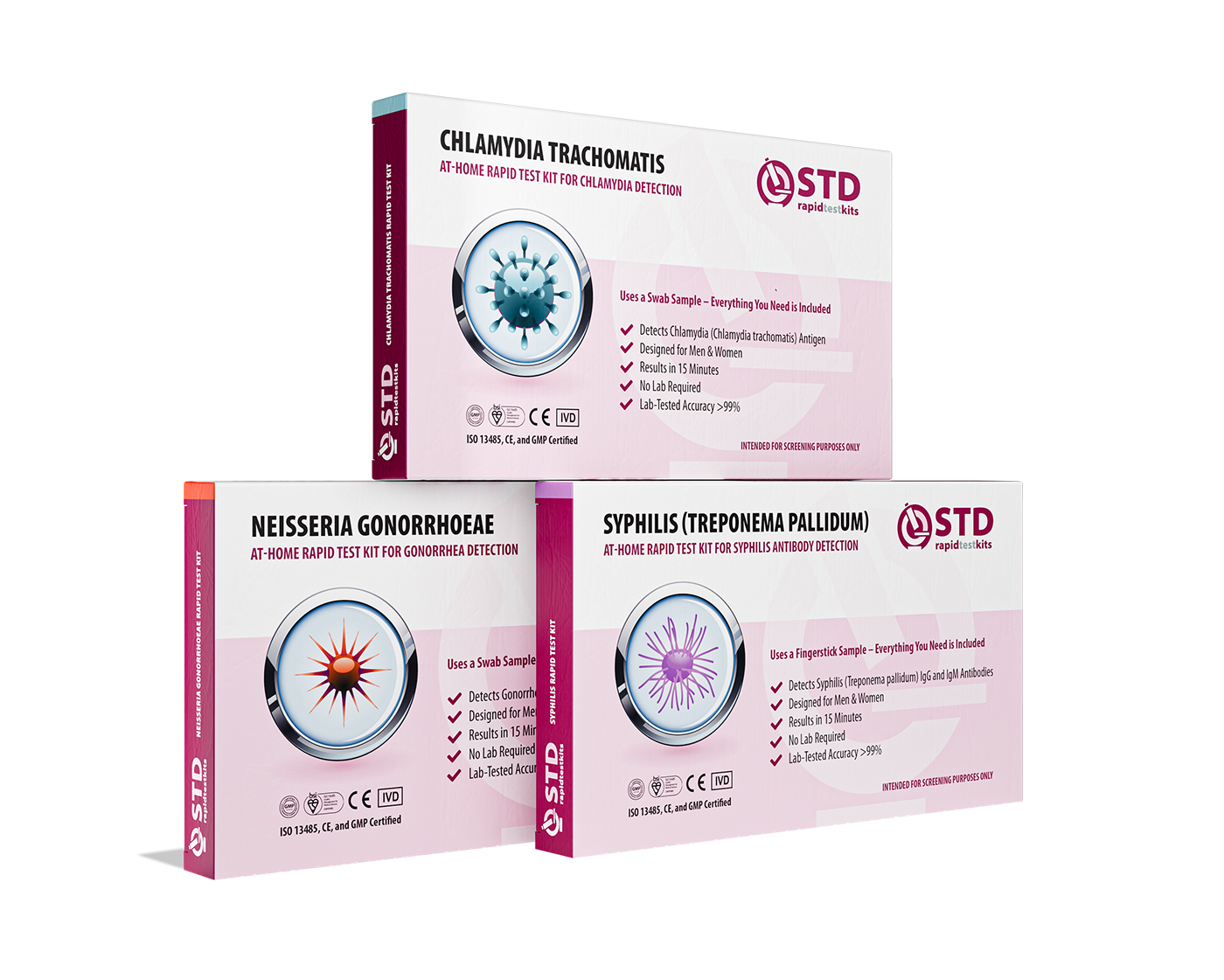Is That Faint Line a Positive Chlamydia Test? What It Really Means
Quick Answer Box
Can you test for chlamydia at home?
Yes, chlamydia can be tested at home using a urine-based test kit. These kits are discreet and accurate and can deliver results within days, no clinic visit required.
The STD That Doesn’t Always Speak Up
Chlamydia isn’t dramatic. It doesn’t usually come with intense symptoms or flashy warning signs. That’s exactly what makes it dangerous. Around 70% of women and 50% of men with chlamydia experience no symptoms at all. And when symptoms do show up? They’re often brushed off as UTIs, yeast infections, or just “something I ate.” You might feel:
- Burning during urination
- Unusual discharge
- Pelvic pain or spotting
- Testicular tenderness
That quietness is how it gets passed on. You don’t feel sick, so you don’t get tested. But left untreated, chlamydia can cause infertility, chronic pelvic pain, and increased risk of HIV transmission. Testing isn't about panic, it's about peace of mind. And now, you don’t even have to leave the house to get it.

People are also looking for: Can I buy these test kits if I live outside the U.S.?
How Home Chlamydia Tests Work (Yes, It’s Really Just Pee)
Let’s break the mystery: Chlamydia urine tests are shockingly simple. Here's what usually comes in a reputable kit:
- A sterile urine collection cup
- A sample vial or swab tube
- Clear, step-by-step instructions
- A prepaid envelope to send your sample to a certified lab
Most home kits ask you to collect your first morning urine, when bacterial DNA concentration is highest. You seal the sample, ship it to the lab, and get results in 1–5 days via a secure portal or app.
Accuracy? Modern chlamydia home kits can hit 90–98% sensitivity, making them comparable to clinic tests, as long as you follow the instructions
OTC Treatments: Hope or Hype?
Here’s the hard truth: There is no FDA-approved over-the-counter medication that cures chlamydia. If you search online, you’ll find herbal blends, immune boosters, and “natural cleanses” that claim to work. But none of them are proven to eradicate the bacteria.
What does work?
- Azithromycin (single dose)
- Doxycycline (twice daily for 7 days)
These are prescription antibiotics. In some places (like the UK or certain U.S. states with telehealth laws), you can get them without an in-person visit. But that still counts as a prescribed treatment, not an “over-the-counter” fix. Buying antibiotics off sketchy online pharmacies or taking leftover meds isn’t just ineffective, it’s risky. The wrong dose can make things worse, not better.
So what’s the move? Get tested first. Then seek telemedicine treatment, like services that partner with at-home test providers to prescribe and ship antibiotics discreetly.
Check Your STD Status in Minutes
Test at Home with RemediumChlamydia Test Kit

 For Men & Women
For Men & Women Results in Minutes
Results in Minutes No Lab Needed
No Lab Needed Private & Discreet
Private & DiscreetOrder Now $33.99 $49.00
Numbers That Don’t Lie: Why Testing Matters More Than You Think
Let's talk raw data, because feelings are valid, but so are the stats.
- 1 in 20 sexually active young women has chlamydia, according to the CDC.
- 129 million new cases are estimated worldwide every year.
- Rates are rising fastest among people under 25, especially those who don’t regularly use condoms.
And here’s the kicker: Nearly 70% of those cases are asymptomatic. That means if you’re sexually active, even in monogamous relationships, you could be a carrier and not know it.
That’s why routine screening matters. Especially if:
- You’ve had a new partner in the last 6 months
- You’re under 30 and sexually active
- You’ve had chlamydia before
- You or your partner don’t use barrier protection consistently
Testing isn’t about catching someone in a lie. It’s about protecting your body, your future fertility, and your peace of mind.
Expert Insight: What Doctors Want You to Know
“People assume they’d know if they had chlamydia,” says Dr. Liana T., MD, a sexual health physician in Los Angeles. “But that’s one of its biggest dangers, most people don’t feel a thing. That’s why I tell patients: if you’ve had unprotected sex, get tested. Even if you feel totally fine.”
Dr. Liana also warns against relying on over-the-counter remedies.
“Antibiotic resistance is a growing issue. Taking the wrong medication, or stopping early, can make infections harder to treat.”
Telehealth, she says, is bridging the gap.
“We’re seeing more patients get diagnosed via at-home kits and treated through virtual prescriptions. It’s a game-changer for access and discretion.”
A Quiet Infection with Loud Consequences
Let’s meet “Sara,” a 23-year-old student who tested positive through a home kit. She’d had mild discharge and some pelvic cramping but chalked it up to stress.
“I didn’t want to go to the student clinic and explain my sex life,” she said. “I used the Chlamydia and Gonorrhea Combo STD Home Test Kit, mailed it off, and had results by the weekend.”
Sara got a virtual consult, started doxycycline, and told her partner, who also tested positive.
“If I hadn’t tested, we might both still have it. I’m so glad I caught it before it messed with my fertility.”
Stories like hers are common. And they’re reminders that chlamydia isn’t about shame, it’s about staying in control.

People are also looking for: Do at-home STD tests work?
What’s Next? Practical Steps After a Positive Test
So your home test came back positive. What now?
- Don’t panic. Chlamydia is 100% treatable with the right antibiotics.
- Get a prescription. Use a telehealth service or visit your doctor.
- Tell your partners. Anyone you’ve had sex with in the last 60 days needs to know and get tested.
- Avoid sex until treatment is done. That means 7 days after finishing your meds, and your partner(s) should do the same.
- Retest in 3 months. Reinfection is common, especially if partners don’t get treated.
You don’t have to handle this alone. Most home test companies include follow-up options or support services to guide you through next steps.
The Myth List: What Chlamydia Isn’t
Myth 1: If I had chlamydia, I’d know.
Nope. Most people don’t have any symptoms. It’s called a “silent infection” for a reason.
Myth 2: You can only get chlamydia from penetrative sex.
False. Oral and even non-penetrative genital contact can transmit the bacteria.
Myth 3: You can treat chlamydia with cranberry juice or herbal pills.
Please don’t. Only antibiotics like azithromycin or doxycycline can cure it.
Myth 4: Once you’re cured, you’re immune.
Wrong again. You can get reinfected as many times as you’re exposed.
Myth 5: You can’t get chlamydia in a monogamous relationship.
Infidelity isn’t the only reason, many people carry it for months unknowingly, even from past partners.
Check Your STD Status in Minutes
Test at Home with Remedium3-in-1 STD Test Kit

 For Men & Women
For Men & Women Results in Minutes
Results in Minutes No Lab Needed
No Lab Needed Private & Discreet
Private & DiscreetOrder Now $69.00 $147.00
For all 3 tests
What the Future Holds: Better Access, Less Stigma
The rise of at-home STD testing is part of a bigger movement, healthcare on your terms. People want care that’s private, fast, and doesn’t come with side-eyes from clinic staff or awkward waiting rooms.
Future trends to watch:
- More integrated telehealth + testing platforms
- Faster test turnaround times
- AI-backed symptom checkers
- Increased insurance coverage for at-home kits
Stigma’s not going away overnight. But each person who tests, treats, and talks about it chips away at the shame. You don’t have to whisper “STD” anymore. You can just pee in a cup and handle your business.
FAQs
1. Can chlamydia be treated without antibiotics?
No. Prescription antibiotics alone can treat chlamydia.
2. How long does chlamydia remain in your system?
If left untreated, it can last for years or months, quietly damaging reproductive organs.
3. Can chlamydia go away by itself?
Seldom. It can be cleared by the immune system but this is unpredictable and dangerous.
4. How soon after exposure can I test?
You have to wait for at least 1 to 5 days after contact for urine-based tests to detect chlamydia.
5. Can chlamydia be passed on through a toilet seat?
No. Chlamydia will not live outside the body and cannot be transmitted via toilet seats.
6. Can chlamydia antibiotics be bought over the counter?
Not in most locations, legally. You will require a prescription from a licensed telehealth service or healthcare provider.
7. Will I always test positive after treatment?
No. Most people are negative 3–4 weeks after they finish antibiotics.
8. Are men asymptomatic carriers of chlamydia?
Yes. Most men are asymptomatic carriers and transmit it without knowing.
9. Is chlamydia harmful if you're pregnant?
Yes. It can lead to preterm labor, low birth weight, and infections in the newborns' eyes.
10. What if my partner won't get tested?
It's hard but necessary. Infected partners can reinfect you and cause serious long-term harm.
You Deserve to Know
If something feels off, or even if it doesn’t, you deserve answers. Chlamydia isn’t rare, and it’s not shameful. It’s common, it’s manageable, and it’s preventable. And now, you don’t have to take time off work, explain yourself to a stranger, or sit in a cold waiting room just to find out what’s going on down there.
You can test. You can treat. And you can move forward. Don’t guess. Don’t wait. Find out for sure, privately, quickly, and without judgment.










